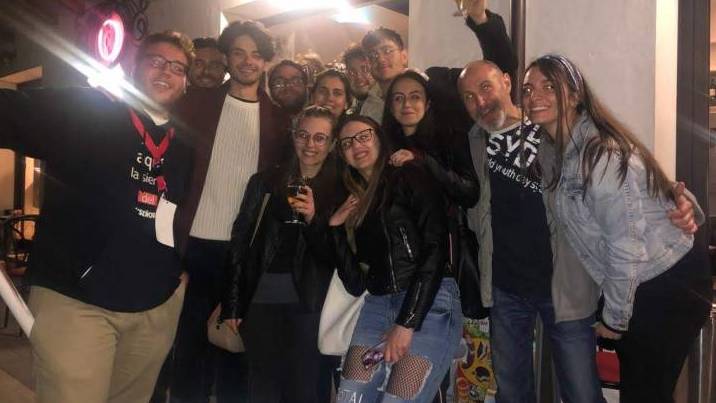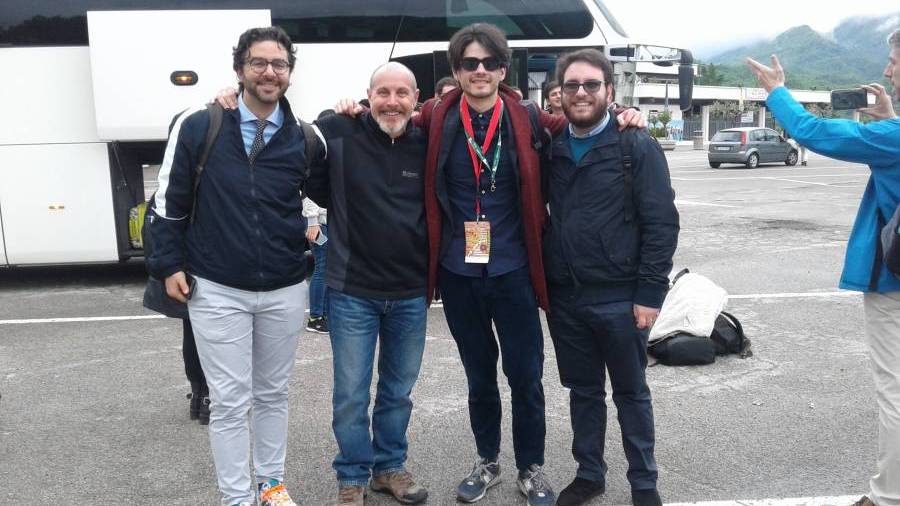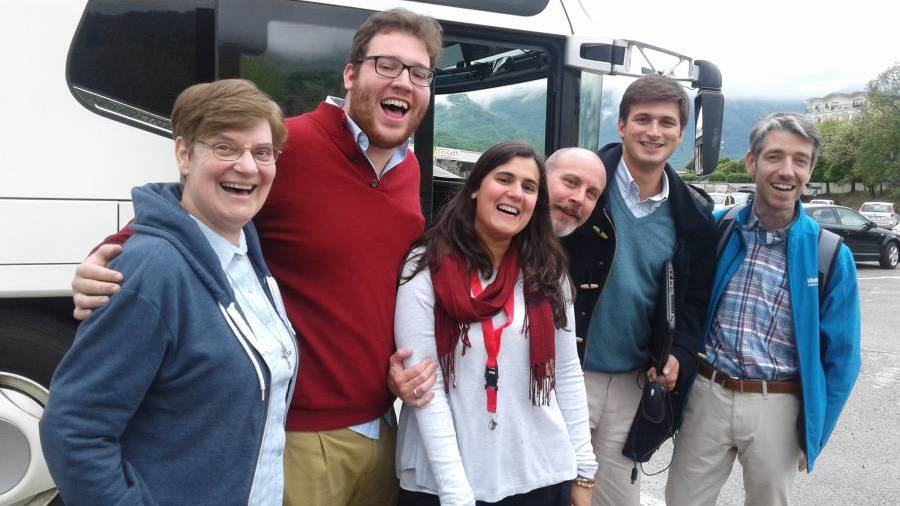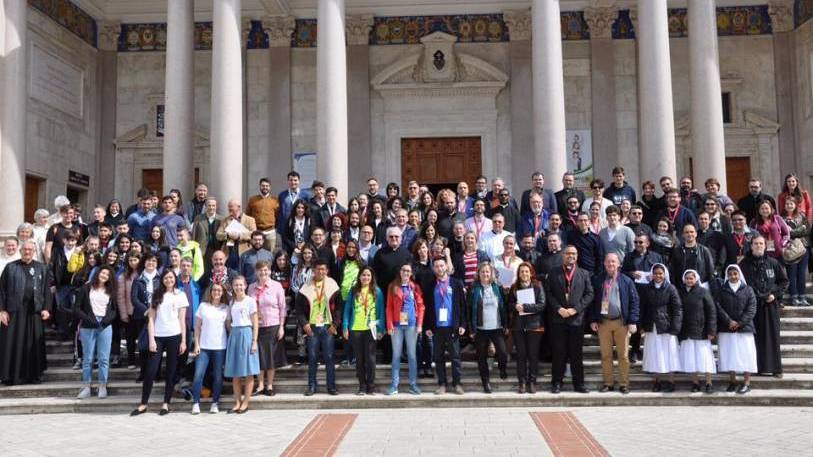



Deacon-structing The Book of Acts: Living It!
Deacon Pedro
Sunday, May 26, 2019

Our new friends. Photo by Joana Amaral.
“Where are you from?”
That’s how it all started. A simple question, very similar to the way I imagine a lot of conversations with Jesus started. “Master, where are you staying?” Not that this was with the Master or anything like it.
“I am from Canada,” was the response.
We were in a little village in Teramo, Italy, near the Shrine of St. Gabriel of Our Lady of Sorrows.
“Why are you here?”
I imagine this would have been a question for Jesus too. It was likely a question for all the Apostles as they went to the ends of the earth making disciples of all nations.
 These conversations continued at the bar, now with beers all around. It was a pleasant evening. I was enjoying my time with these young people. There is something to say about how young people keep us young. I need not add that I am about twice as old as the oldest of them. I didn’t feel that old.
At some point, one of the young men from the group next to us walked through our group to go inside and get another drink. I didn’t even notice him.
On his way back he stopped as he walked through our group.
These conversations continued at the bar, now with beers all around. It was a pleasant evening. I was enjoying my time with these young people. There is something to say about how young people keep us young. I need not add that I am about twice as old as the oldest of them. I didn’t feel that old.
At some point, one of the young men from the group next to us walked through our group to go inside and get another drink. I didn’t even notice him.
On his way back he stopped as he walked through our group.
 The main young man was a 17-year-old named Diego. He'd had a bit too much to drink and was clearly the class clown. The young atheist girl, Giulia, was 18 years old. The others were Valentina and Hilaria, another Valentina, Dino, Antonio, and Agostino. Most of them were in the early twenties. I know that one of the Valentina's was 28.
At one point Agostino broke into a conversation I was having with Giulia and Valentina and asked, “What would you tell someone who’s lost his faith?”
Such a profound and meaningful question. It’s a question we all need to ask because we need to be able to have that conversation with anyone we know who’s lost their faith, with all who are searching.
The main young man was a 17-year-old named Diego. He'd had a bit too much to drink and was clearly the class clown. The young atheist girl, Giulia, was 18 years old. The others were Valentina and Hilaria, another Valentina, Dino, Antonio, and Agostino. Most of them were in the early twenties. I know that one of the Valentina's was 28.
At one point Agostino broke into a conversation I was having with Giulia and Valentina and asked, “What would you tell someone who’s lost his faith?”
Such a profound and meaningful question. It’s a question we all need to ask because we need to be able to have that conversation with anyone we know who’s lost their faith, with all who are searching.
 Recently, our blog editor, Kristina Glicksman, shared with me this quote from Pope Paul VI's Evangelii Nuntiandi:
Recently, our blog editor, Kristina Glicksman, shared with me this quote from Pope Paul VI's Evangelii Nuntiandi:
 Every week, Deacon Pedro takes a particular topic apart, not so much to explore or explain the subject to its fullness, but rather to provide insights that will deepen our understanding of the subject. And don’t worry, at the end of the day he always puts the pieces back together. There are no limits to deaconstructing: Write to him and ask any questions about the faith or Church teaching: [email protected]. Follow him on Facebook, Twitter and Instagram.
Every week, Deacon Pedro takes a particular topic apart, not so much to explore or explain the subject to its fullness, but rather to provide insights that will deepen our understanding of the subject. And don’t worry, at the end of the day he always puts the pieces back together. There are no limits to deaconstructing: Write to him and ask any questions about the faith or Church teaching: [email protected]. Follow him on Facebook, Twitter and Instagram.
I love the Acts of the Apostles.
It’s my favourite book in the Bible. I love it because it’s our book. It’s the story of Christianity after the Resurrection. It’s our story. We are living Christianity after the Resurrection. And during the Easter season we read about all these encounters: Philip and the Ethiopian eunuch (Acts 8:26-40); Peter and Cornelius and his family (Acts 10); Paul and Priscilla and Aquila (Acts 18:1-3); Priscilla and Aquila meeting Apollos (Acts 18:24-28); encounters that probably started with just one question: “Where are you from?” We were in a bar, which was fairly crowded because apparently the local soccer team had just won a game. There were several young people sitting, standing, drinking, smoking outside. We took our place at a table next to them. Some of us also standing, sitting, smoking. I had not planned on going to this bar. It was already way past my bedtime. But you see, when you are at a gathering with people from different countries, making new friends, it’s hard to say no when you are invited to come for one last drink into town. “Come. When will you be in Teramo again?” When will we be together again?” It’s hard to say no when it’s put like that. And so, that’s how I found myself walking 20 minutes into town, at 11pm, with three guys named Francesco from Italy and with Joana and Frederico from Portugal. The long walk was partly due to the fact that we were not sure where we were going. We were betting on finding a bar that was open. One of the Francescos, who came from a village nearby, actually phoned his grandmother to ask her where we could go. The walk gave us ample time to continue various conversations that had started earlier in the evening: about women cardinals; about female deacons; about deacons wearing clerics; about WYD in Portugal; about canon law; about vocations; about discernment…. It was very synodal.We were literally walking with each other….

Deacon Pedro and the three Francescos.
He turned and listened.
Honestly, I didn’t even notice him then either. Who knows what the conversation was at that point. But then he looked straight at me and asked, “Where are you from?” I guess it was obvious that we were from out of town. Add to that the fact that our conversation was a mixture of Italian, English, Portuguese, French, and Spanish. The same must have prompted many at Pentecost to ask the Apostles where they were from when they began to speak in many languages (see Acts 2). “I am from Canada.” “Why are you here?” “We are here for a meeting at the Shrine of San Gabriele. You know the Shrine?” By then several of his friends had moved closer to listen in. A few of them said that they knew about the shrine. But still, they were curious. “But why are you here?” Then I said two words that changed everything.“Jesus Christ.”
“We are here because of Jesus Christ.” As soon as His name escaped my lips, a young woman laughed and said she was an atheist. I looked at her and I said, “Saying you’re an atheist only tells me what you don’t believe in. What do you believe in? Your friends? This beautiful night? This beer? What do you believe in?” And that was it. We spent the next three hours having the most awesome, miraculous, joyful, and life-changing conversations about life, religion, God, Jesus Christ, the Church, vocations, and discernment (and soccer).It was very synodal.
I was so thankful that Frederico and Joana and the three Francescos were there. Each one of us moved from conversation to conversation as some eight young people joined our group, asking questions, challenging our beliefs, sharing deep thoughts and personal feelings.
The Canadians and the Portuguese: Sr. Francine Guilmette, FMA, Frederico Matos, Joana Amaral, Deacon Pedro, Joaquin Goes, and Sebastien Lacroix.
And we are all searching.
This must have been exactly what the life of the early Apostles was like. They went from town to town, finding themselves in strange and unusual circumstances, but only with one mission: to share Jesus Christ. They probably didn’t usually start the conversations but waited for that first question: “Where are you from?” or “Why are you here?” And the rest is the stuff that the Book of Acts is written about. After two beers (and two trips to the bathroom), thinking that it was more than way past my bedtime, I asked what time it was. Three young people pulled out their phones and shouted that it was 1:30. Then I said something that I didn’t expect and I can’t say that I planned it or how it came to be in my mind: “You know what time it is? It’s time to pray.” At this, they all gathered around (perhaps some snickers, but I plowed through anyway). I closed my eyes, raised my hands and prayed out loud, right there outside that bar. I prayed for these young people. I thanked God for allowing us to meet and I prayed that they would always know how much they are loved. I prayed that everything they do begins with His inspiration and continues with his saving Grace. Then I gave them a blessing and I said goodnight. I told them that we had Mass at the Shrine the next morning, Sunday, at 11am and that they should come. They said they had to go to Mass to their own parish in Cerchiara. I didn’t insist that they come to our Mass and said goodnight. But they said, “Don’t leave. Stay.” How biblical (Luke 24:29).I wonder if their hearts were on fire. Mine was.
I said it was late. Diego went inside to buy more beer. “One more beer. Stay.” So we stayed another hour: More conversations. More sharing. More communion. Finally, at 2:30am we made our way back to the retreat house by the Shrine of San Gabriele. We were high. Oh, we were high. “What just happened?” None of us knew, except that it had been miraculous.We had lived Christus Vivit. We had lived evangelization.
The reason we were in Teramo was for the anniversary celebration of the canonization of St. Gabriel of Our Lady of Sorrows, a young Passionist seminarian who died at age 23 from tuberculosis and is now the patron saint of Catholic youth, of students, and of those studying for the priesthood. We were invited by the Bishop of Teramo, Mons. Lorenzo Leuzzi, for a meeting, “From San Gabriele to St. John Paul II: The WYDs in the Life of the Church”. As part of the celebrations, some 50 of us gathered to learn from each other and to share the impact of WYD in our countries. We prayed the Rosary during a Vigil with Vatican Secretary of State, Cardinal Pietro Parolin (watch the video) , and we listened to various presentations on the topic of World Youth Days and the Synod on Youth. We each received a copy of the Post-Synodal Document, Christus Vivit, but that night, I realized that the six of us at least didn’t need to read it; we lived it with those kids at that bar. Young people need to be met where they’re at. They need to be listened to. We need to take their questions seriously and be honest with our answers. They need to be challenged and given responsibility. They need to be invited and we need to walk with them. That’s what we did that night. The Good News is that this strategy doesn't just work with young people: This is how we are to evangelize everyone! The Christus Vivit approach is for everyone. The next morning, none of them came to Mass at the Shrine. At least I didn’t see any of them. I prayed that some would come – that would have been a confirmation that our work was done. I have to admit I was a bit saddened that none of them came. But that’s the other part of working with young people. It’s probably the hardest part: we have to invite them and be willing to walk with them without expecting any particular result. God can worry about the results. We just need to do the work.And not be afraid to say His name: Jesus Christ.
That’s the stuff that the Book of Acts is made of. That’s why the Post-Synodal Document is called “Christus Vivit”. It’s probably what most of us are scared of and why many fail at youth ministry.
The whole group: Participants in the "From San Gabriele to St. John Paul II 2019" gathering.
This week we celebrate the Feast of the Ascension and then comes the Feast of Pentecost. That’s where it all began. We must trust that the Spirit that came upon the apostles so long ago is still active today. It is still the same creative Spirit that leads us into strange and awesome circumstances and that propels us to proclaim the name of Jesus Christ to all nations. - For more, here's a short video about the gathering, created by Teramoweb:"The Holy Spirit is the soul of the Church. It is He who explains to the faithful the deep meaning of the teaching of Jesus and of His mystery. It is the Holy Spirit who, today just as at the beginning of the Church, acts in every evangelizer who allows himself to be possessed and led by Him. The Holy Spirit places on his lips the words which he could not find by himself, and at the same time the Holy Spirit predisposes the soul of the hearer to be open and receptive to the Good News and to the kingdom being proclaimed. "Techniques of evangelization are good, but even the most advanced ones could not replace the gentle action of the Spirit. The most perfect preparation of the evangelizer has no effect without the Holy Spirit. Without the Holy Spirit the most convincing dialectic has no power over the heart of man." (EN #75)
 Every week, Deacon Pedro takes a particular topic apart, not so much to explore or explain the subject to its fullness, but rather to provide insights that will deepen our understanding of the subject. And don’t worry, at the end of the day he always puts the pieces back together. There are no limits to deaconstructing: Write to him and ask any questions about the faith or Church teaching: [email protected]. Follow him on Facebook, Twitter and Instagram.
Every week, Deacon Pedro takes a particular topic apart, not so much to explore or explain the subject to its fullness, but rather to provide insights that will deepen our understanding of the subject. And don’t worry, at the end of the day he always puts the pieces back together. There are no limits to deaconstructing: Write to him and ask any questions about the faith or Church teaching: [email protected]. Follow him on Facebook, Twitter and Instagram.Related Articles:
<<
SUPPORT LABEL
$50
$100
$150
$250
OTHER AMOUNT
DONATE
Receive our newsletters
Stay Connected
Receive our newsletters

Stay Connected







